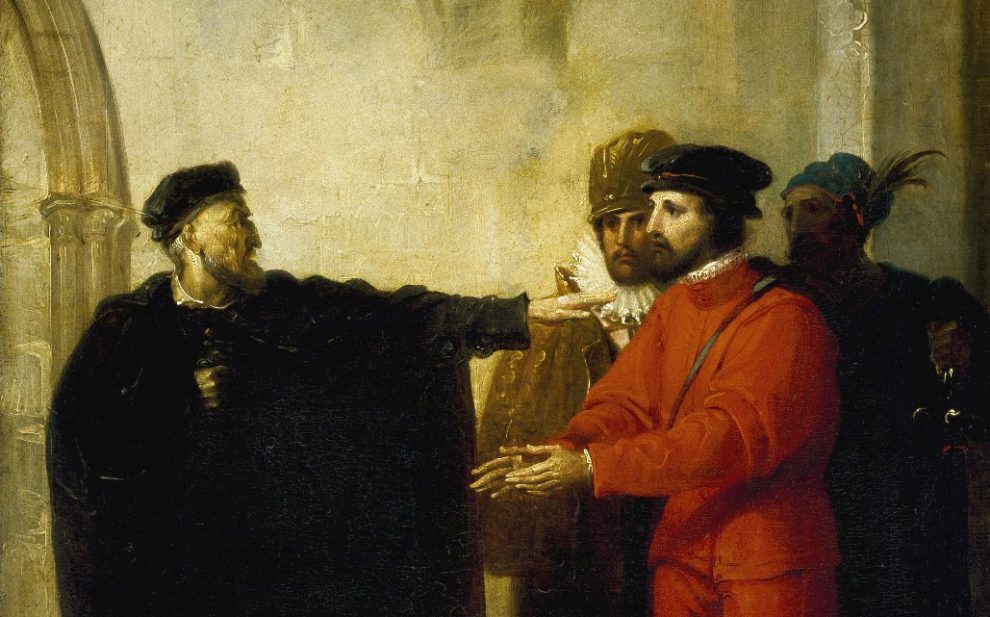I first encountered the concept of the Catholic imagination at university. Writers such as G. K. Chesterton, Evelyn Waugh, and Flannery O’Connor captured my imagination with their depiction of complex characters grappling with life’s ultimate questions in landscapes marked with the sacramentality of a creation in which the divine is palpably present.
Yet in many of these same works, I came face to face with overt antisemitism.
One of the most troubling instances was Geoffrey Chaucer’s “The Prioress’s Tale,” which presents one of the earliest instances in literature of the horrific “blood libel,” an antisemitic conspiracy theory that claims Jews ritually murder children.
As we read and discussed this story in class, the professor waxed eloquent about Little Saint Hugh, the child in the story who is killed by Jews because he is heard singing a hymn to the Virgin Mary. I remember sitting in my desk in a circle, the lone ethnic Jew in our class, wondering why my people were being portrayed with such hatred. I remember wondering whether this was something my classmates accepted as normal.
It is impossible to study the Western literary canon and not confront this kind of prejudice. Works such as William Shakespeare’s The Merchant of Venice and Charles Dickens’ Oliver Twist are famous for perpetuating antisemitic stereotypes. Ezra Pound, perhaps the most technically brilliant poet of the English language in the 20th century, was an antisemite who connected Jews with the “usura” he rails against in The Cantos and who ended up imprisoned for his support of Italian dictator Benito Mussolini’s fascism during World War II.
Two of the worst offenders are writers who influenced me extensively in my early college years: G. K. Chesterton and Hilaire Belloc.
In both cases one might point to their distrust of Jews as motivated by anticapitalism. But this excuse is insufficient and only perpetuates the idea that Jews are portrayed exclusively as evil bankers and grasping misers.
For both Chesterton and Belloc, “the Jews” as a cultural entity are fundamentally alien to any nation in which they reside and are to be regarded with suspicion.
Belloc’s controversial but still highly popular book The Jews presents the disturbing argument that Jewish people can never be assimilated into any culture and that there is a “Jewish problem” consisting of an essential friction between Jewish communities and any nation in which they reside.
Belloc even poses “extermination” as a possible solution to this supposed problem. His conclusion that this solution would be inefficient and inhumane is far from admirable. Writing off genocide as “inhumane” is not moral courage; it is the least one can expect of a person who is not a sociopath.
It is impossible to study the Western literary canon and not confront this kind of prejudice.
In Chesterton a similar prejudice held for similar reasons is almost more disturbing, because Chesterton is the more lovable figure, and his prejudices are closely tied with some of his more attractive views.
This includes the romance of localism, which appears in his fiction as well as his nonfiction. The Napoleon of Notting Hill, for example, charmingly depicts a character passionately devoted not only to his land but also to his immediate neighborhood. In Chesterton’s work, home is always calling and small is always beautiful. Yet these alluring ideals relate to the view that Jews are always alien.
Chesterton’s Jewish characters, when they show up in his fiction, appear ominously—as fundamentally “other” and malevolent. In The Flying Inn—a swashbucklingly delightful novel, aside from the fact that its entire plot hinges on Islamophobia—Jewishness is depicted as foreign and thus just another threat to old embattled England.
The Islamic threat is presented as militaristic, so the Muslim leader enters the scene as a worthy opponent for the novel’s manly English hero. Chesterton’s Jewish characters, by contrast, darkly menace on the sidelines. Even in his “Father Brown” stories, his prejudices against the Jews are evident, couched in the same kind of rhetoric about shadowy global organizations that we are troubled by today.
Former Boston College professor William Kilpatrick, writing in Crisis magazine in 2014, praised The Flying Inn as a prophetic work in its supposed foretelling of an Islamic “colonization” of England enabled by “cultural elites.” This is just one recent instance of traditionalist Catholics looking past Chesterton’s more progressive elements—his concern for social justice and the environment, insistence on workers’ rights, and criticism of capitalism—for the sake of his romanticized xenophobia.
But those of us who enjoy Chesterton for his many valuable insights and for the sheer good fun of his stories need to be wary about looking past his antisemitism in the same way. As Adam Gopnik writes about Chesterton in the New Yorker:
“The trouble for those of us who love Chesterton’s writing is that the anti-Semitism is not incidental: it rises from the logic of his poetic position. The anti-Semitism is easy to excise from his arguments when it’s explicit. It’s harder to excise the spirit that leads to it—the suspicion of the alien, the extreme localism, the favoring of national instinct over rational argument, the distaste for ‘parasitic’ middlemen, and the preference for the simple organ-grinding music of the folk.”
In Chaucer, Belloc, and Chesterton the antisemitism is overt. In writers such as Evelyn Waugh, it lurks in the background. As Nora Sayre writes in the New York Times, Waugh’s antisemitism is “nonviolent but undeniable.” Although he never appears to advance any of the common antisemitic notions regarding the Jews as “Christ killers,” his prejudices appear to have been connected less with his religious faith than with his snobbery.
In his private writing Waugh frequently uses common slurs to refer to Jewish people and speaks of them disdainfully as a class and not even as persons. In his fiction his antisemitism crops up most notably in his repeated depiction of World War II as an aimless and even buffoonish enterprise war, with no consideration of the plight of the Jews under Nazi rule.
It is evident as well in his allusion to tropes about the villainous or grasping Jew in such characters as Augustus Fagan in Decline and Fall (Little, Brown and Company) and Father Rothschild in Vile Bodies (Little, Brown and Company). In Helena (Little, Brown and Company) his variation on the “Wandering Jew” draws on shopworn stereotypes and robs the already antisemitic archetype of its pathos.
How should academic and literary Catholics deal with this? Some might argue that we don’t have to. It’s simply a reality we must live with, a part of history.
It is widely known that some of our most beloved Catholic writers held racist and bigoted views. Recent discussions have revealed that Flannery O’Connor was a lot more racist toward Black people than some of us realized. In 2020, Angela Alaimo O’Donnell’s book Radical Ambivalence: Race in Flannery O’Connor (Fordham University Press) brought to light some of her more damning comments on racial issues.
Paul Elie, a senior fellow at Georgetown University, responded in several essays that this failure to take O’Connor’s racism seriously has been a “stumbling block” for students of her work. Following this, Loyola University Maryland decided to remove O’Connor’s name from a dormitory, provoking outrage among some Catholic scholars who feared she was being “canceled.”
But I don’t think it’s sufficient to write off dangerous ideologies as simply products of their time, especially as each of these times had its prophets speaking out against evil: its abolitionists, suffragists, and civil rights activists. Catholic thinkers and artists are the ones we expect to take up this prophetic vocation, to speak out against the sins of their day—not to succumb to them and certainly not to promote them.
Catholic writers and thinkers who purport to build on the tradition of the Catholic imagination have a special responsibility to address these questions.
Catholic writers and thinkers who purport to build on the tradition of the Catholic imagination have a special responsibility to address these questions.
Teachers and professors in Catholic universities need to help students to recognize and repudiate antisemitic strands of thought as well as consider the dangers latent in seemingly benevolent ideologies. Writers and artists in the Catholic tradition need to do the extra work of learning Jewish stories, Jewish interpretations, and educating themselves on the difference between appreciation and appropriation.
Because Catholics do seem to love Jewish stuff. They like Jewish traditions, rituals, music, and stories. They like the Jewish scriptures. Do they love the Jewish people, though? Or is this fetishization of Jewishness simply a kind of superficial appropriation or a fondness for surface aesthetics—another variation on the preference for the “simple organ-grinding music of the folk” that Gopnik describes?
Many Catholics are also quick to embrace and applaud Jewish writers and thinkers who convert to the Roman church, such as Edith Stein. This, they may say, is proof that Jews are welcome.
But as long as our written heritage of antisemitism goes unaddressed, it is clear that the love many Catholics profess to feel for Jews is predicated on a Jewish person’s willingness to jettison some of their Jewishness. Perhaps it is time to ask Catholic thinkers to jettison some of their biases about Jews instead.
After all, the institutional church has moved on from its earlier damaging perspectives on the Jewish people. In 1965 Pope Paul VI’s Nostra Aetate (Declaration on the Relation of the Church to Non-Christian Religions) officially condemned all expressions of antisemitism.
On the 50th anniversary of Nostra Aetate, Jonathan A. Greenblatt of the Anti-Defamation League wrote, “The Church’s unequivocal declaration that the Jews should not be held accountable for the death of Jesus and its repudiation of anti-Semitism were truly revolutionary.
The affirmation that ‘God holds the Jews most dear’ and the call for mutual understanding and dialogue inaugurated a new era of positive relationship and engagement that, mere decades before, was inconceivable.” In 2015, Pope Francis asserted on Nostra Aetate: “From indifference and opposition, we’ve turned to cooperation and goodwill. From enemies and strangers, we’ve become friends and brothers.”
My own direct experiences of antisemitism among Catholics leave me unable to be as optimistic about our progress as Pope Francis. When I reflect on my experience in university of reading Chaucer among Catholics, here is what stands out to me: In my classroom no one cared about Chaucer’s antisemitic representations, because they did not expect any Jewish persons to be present. The discourse unfolded in a specifically non-Jewish space, where it could not possibly be construed that Jewish feelings or beliefs might matter. The Jews were assumed to be elsewhere—other.
Does this mean that the Catholics I studied with were antisemitic “Jew haters”? I am sure most of them, when asked, would say that they love and admire the Jewish people. Yet at the same time they were willing uncritically to accept antisemitic tropes so extreme as to be associated with pogroms and genocide.
I hope that in the times to come more Catholic academics and artists will feel called to do the much-needed work of addressing and correcting the antisemitism in our literary tradition.
Nevertheless, a solid foundation has been laid and much good work done in the 55 years since Pope Paul VI’s revolutionary declaration. I hope that in the times to come more Catholic academics and artists will feel called to do the much-needed work of addressing and correcting the antisemitism in our literary tradition.
Catholic literary artists might begin by considering doing a work of atonement for our collective failures by addressing the reality that, for much of our shared history, the relationship of Christians to Jews was one of oppressor and oppressed. How can this understanding direct our work as artists? What stories need to be told that have been neglected?
More Catholic scholars could also spend time gaining familiarity with the Jewish literary tradition and study it alongside the Catholic literary canon to gain a better understanding of the diversity of the Jewish experience throughout different cultures, languages, and eras. This could be a helpful corrective to our damaging tendency to reduce or appropriate Jewishness.
We should also engage with Catholic and Catholic-adjacent writers who treat Jewish persons and issues respectfully.
For instance, a study of Waugh could be balanced and corrected with a reading of the works of novelist Muriel Spark, who was ethnically Jewish but converted to Catholicism and who treats the reality of Jewishness with thoughtfulness and care.
Novelist Anthony Burgess, whose works retain a strong Catholic sensibility even though he left the church, centers Jewish voices and perspectives in his writings and does not flinch from the horrors of antisemitism in Christian Europe.
A worthwhile project, in the spirit of Nostra Aetate, would be to seek out more such writers and give greater attention to their work. We cannot afford to look away from or write off the rampant antisemitism of some of our most beloved literary figures. We need to grapple with their writings honestly and ask how the valuable aspects of texts or traditions can be parsed from those toxic aspects that promote bigotry or hate.
Image: Wikimedia Commons/ Shylock Rebuffing Antonio, Richard Westall, 1795













Add comment